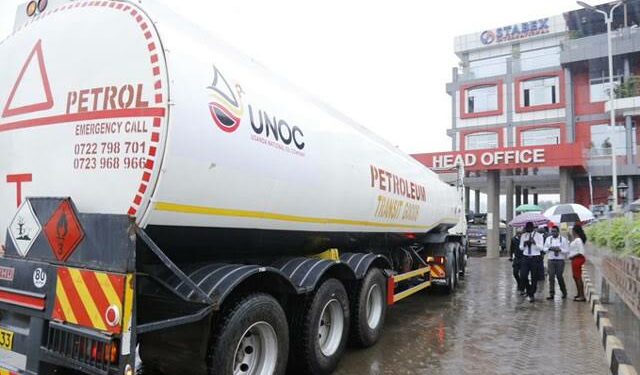In a significant move towards regional energy cooperation, Kenya has granted the Uganda National Oil Company (UNOC) permission to import petroleum products into Uganda starting from May 2024.
This decision follows the approval of a certificate of incorporation by the Kenyan government, as announced by the Minister of Energy and Mineral Development Hon. Ruth Nankabirwa.
This development stems from a recent meeting between Kenya’s President, Dr. William Ruto, and Ruth Nankabirwa, held in Nairobi on Monday.
The meeting was convened after Uganda’s request to utilize the Kenya Pipeline Company (KPC) facility for transporting refined petroleum products from Mombasa Port, which was denied.
In September 2023, UNOC submitted an application to the Energy and Petroleum Regulatory Authority (EPRA) of Kenya to be recognized as an Oil Marketing Company (OMC), allowing it to engage in fuel import and export activities similar to other Kenyan OMCs and utilize KPC infrastructure.
However, EPRA rejected UNOC’s application citing failure to meet necessary standards for an oil importer license. EPRA also expressed concerns about potential displacement of Kenyan companies and undue competition. In response, Uganda contested EPRA’s decision and initiated legal action against Kenya at the East African Court of Justice.
Following the meeting, Nankabirwa disclosed that President Ruto intervened, facilitating an out-of-court settlement that allows UNOC to commence operations. Proscovia Nabbanja, UNOC’s Chief Executive Officer, accompanied by officials from the Ministry of Energy, is currently in Nairobi to obtain the certificate of incorporation.
Nankabirwa mentioned on Thursday that as UNOC starts importing petroleum products into Uganda, besides the anticipated reduction in fuel prices, the company is poised to acquire crucial experience in the oil industry. This experience is deemed vital as Uganda prepares to commence oil and gas extraction from the refinery by 2025.
Currently, about 90 percent of Uganda’s fuel supply originates from Kenya, with the remaining 10 percent imported via Tanzania. Nankabirwa emphasized that Uganda will maintain the Tanzanian route for security purposes and to alleviate logistical expenses, which contribute to the high prices of petroleum products in the Ugandan market.
Minister Nankabirwa addressed journalists during a handover ceremony held at the Ministry Headquarters in Kampala on Thursday. Peter Lokeris, the former Minister of Energy (Minerals), who now serves as the Minister of Karamoja Affairs, officially handed over his duties to Phiona Nyamutoro.
At present, Uganda lacks a direct pipeline from Dar-es-Salam, necessitating fuel transportation via road, partly through the lake via Mwanza, covering a distance of 1,500 km from Dar to the Mutukula border post. This route incurs significant costs.
In another development, Uganda and Tanzania reached a significant milestone on Tuesday when Dr. Nankabirwa and her Tanzanian counterpart, Dr. Doto Biteko, the Deputy Prime Minister and Minister of Energy, inaugurated the East African Crude Oil Pipeline (EACOP) Coating plant.
Located in Sojo village, Nzege District, Tabora Region, this achievement marks a significant step forward in regional cooperation.
As Uganda prepares to navigate its energy landscape, these developments underscore the importance of collaborative efforts in ensuring energy security and economic prosperity in the region.
Do you have a story in your community or an opinion to share with us: Email us at editorial@watchdoguganda.com













